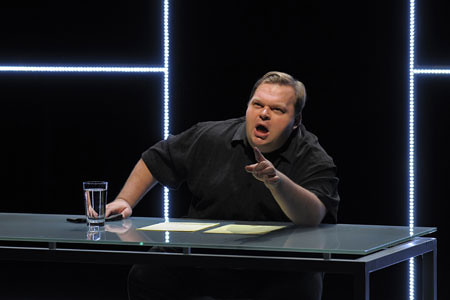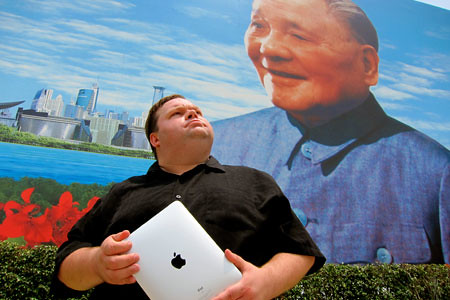More ecstasy than agony in Daisey's Steve Jobs
 Mike Daisey delivers his latest monologue, The Agony and the Ecstasy of Steve Jobs, on a fancy set that looks a little like a laptop. Photo by www.kevinberne.com. Below: To research Apple’s manufacturing process, Daisey traveled to China. Photo by Ursa Waz.It’s interesting that Mike Daisey chooses not to talk about current events in The Agony and the Ecstasy of Steve Jobs, the second of two monologues running in repertory on Berkeley Repertory Theatre’s Thrust Stage.The very title of the show implies that Jobs will factor largely in the two-hour, intermission-free show. But Daisey never mentions that on Jan. 17, Apple announced that Jobs has taken medical leave from the company. Following other health issues – pancreatic cancer in 2004, a liver transplant in 2009 – the departure isn’t a huge surprise, but it’s a very big deal in the world of Apple and, consequently, in the world of technology.Daisey wrote about Jobs’ leave on his blog: “It is almost impossible to imagine Apple without him, and there's a palpable sense of loss and change as the tech industry struggles to know what this will mean for its future.”In his monologue, Daisey disperses a lot of information about Jobs – about how he’s a visionary and an asshole, how he’s obsessed with the beauty of design and ruthless in business. But at a certain point, Daisey leaves Jobs behind to focus on what really concerns him: the abuse of Chinese workers in the manufacture of the world’s technology.In the first part of Berkeley Rep’s Daisey double feature, The Last Cargo Cult, Daisey demonstrates how committed he is to telling fascinating stories by traveling to the South Pacific. For Steve Jobs, Daisey is an outright journalist on a quest for his story. Being a lifelong fan of Apple products (he dismantles his laptop and puts it back together for post-show solace), it suddenly dawned on him that he had no idea how these products were made. Somehow, he had it in his head that robot assembly lines put the things together, bit by tiny byte.Ever inquisitive, he began to ask the question, and it turns out, products like Apple’s iPods, iPhones and iPads are made in Shenzhen, China. Specifically, they’re handmade at a company called Foxconn, which employs, according to Daisey, 430,000 workers and has 25 cafeterias, each of which holds 10,000 people. The company has also been in the news lately because of pesky worker suicides.
Mike Daisey delivers his latest monologue, The Agony and the Ecstasy of Steve Jobs, on a fancy set that looks a little like a laptop. Photo by www.kevinberne.com. Below: To research Apple’s manufacturing process, Daisey traveled to China. Photo by Ursa Waz.It’s interesting that Mike Daisey chooses not to talk about current events in The Agony and the Ecstasy of Steve Jobs, the second of two monologues running in repertory on Berkeley Repertory Theatre’s Thrust Stage.The very title of the show implies that Jobs will factor largely in the two-hour, intermission-free show. But Daisey never mentions that on Jan. 17, Apple announced that Jobs has taken medical leave from the company. Following other health issues – pancreatic cancer in 2004, a liver transplant in 2009 – the departure isn’t a huge surprise, but it’s a very big deal in the world of Apple and, consequently, in the world of technology.Daisey wrote about Jobs’ leave on his blog: “It is almost impossible to imagine Apple without him, and there's a palpable sense of loss and change as the tech industry struggles to know what this will mean for its future.”In his monologue, Daisey disperses a lot of information about Jobs – about how he’s a visionary and an asshole, how he’s obsessed with the beauty of design and ruthless in business. But at a certain point, Daisey leaves Jobs behind to focus on what really concerns him: the abuse of Chinese workers in the manufacture of the world’s technology.In the first part of Berkeley Rep’s Daisey double feature, The Last Cargo Cult, Daisey demonstrates how committed he is to telling fascinating stories by traveling to the South Pacific. For Steve Jobs, Daisey is an outright journalist on a quest for his story. Being a lifelong fan of Apple products (he dismantles his laptop and puts it back together for post-show solace), it suddenly dawned on him that he had no idea how these products were made. Somehow, he had it in his head that robot assembly lines put the things together, bit by tiny byte.Ever inquisitive, he began to ask the question, and it turns out, products like Apple’s iPods, iPhones and iPads are made in Shenzhen, China. Specifically, they’re handmade at a company called Foxconn, which employs, according to Daisey, 430,000 workers and has 25 cafeterias, each of which holds 10,000 people. The company has also been in the news lately because of pesky worker suicides. With the help of a Chinese translator named Kathy, Jobs travels to Shenzhen because, as he says, “Sometimes you have to obey your imperative…You have to go to the door and ask the fucking questions.” So, under the gaze of guards holding machine guns, attempts to interview workers as they come of shift.What he learns, of course, is not good. Some of the workers her interviews are 12 and 13 years old. Workdays are 12 hours and more. Repetition of movement is constant to the point of body warping. In short, the workers, as Daisey relates it, are aware that the devices they’re working on are worth more than their lives.Of course Apple isn’t the only manufacturer taking advantage of Chinese workers – Nokia, Dell, Amazon, Samsung and many others are there as well (Daisey reports that half of the world’s electronic devices are made by Foxconn). But as Daisey points out, Apple is the industry leader – they have the best ideas (if not the best market share), and everyone else is trying to keep up with them.That’s why Apple’s hypocrisy is so alarming. Here’s this humane, beauty-influenced company that wants to make the world a better place resorting to the worst kind of labor abuse to meet market demands.Daisey makes his case in his customarily ferocious way, and he’s assisted by a slick set and lighting design by Seth Reiser that puts Daisey in what looks like a giant Vegas version of a laptop (the LED lights in the screen behind him actually become part of his story). Even his traditional storyteller’s table has been upgraded to sleek metal and glass with lights underneath.Under the direction of Jean-Michele Gregory, the delivery here has more elements of stand-up – he really punches the funny lines and gives Jon Stewart-ish spins to others. He’s funny and apoplectic in equal measure.Daisey really had me until he abandons the soapbox for the pulpit. In the homestretch he really bashes it over our heads. It’s clear he cares passionately about the issue of Chinese workers being treated with decency – how could he not? But he’s already made such a strong case that his final harangue seems like overkill.Perhaps more effective than that last vehement push is the distribution of flyers on the way out of the theater. The sheet, a note from Daisey, contains instructions for contacting Apple customer relations and learning more about labor conditions in China:Apple Customer Relations: 800-275-2273 (or for Apple investors: 408-974-3123)China Labor WatchStudents and Scholars Against Corporate MisbehaviorFOR MORE INFORMATIONMike Daisey’s The Agony and the Ecstasy of Steve Jobs continues in rotating repertory with The Last Cargo Cult through Feb. 27 on Berkeley Repertory Theatre’s Thrust Stage, 2025 Addison St., Berkeley. Tickets are $34-$73 with half-price discounts for anyone under 30. Call 510 647-1918 or visit www.berkeleyrep.org for information.
With the help of a Chinese translator named Kathy, Jobs travels to Shenzhen because, as he says, “Sometimes you have to obey your imperative…You have to go to the door and ask the fucking questions.” So, under the gaze of guards holding machine guns, attempts to interview workers as they come of shift.What he learns, of course, is not good. Some of the workers her interviews are 12 and 13 years old. Workdays are 12 hours and more. Repetition of movement is constant to the point of body warping. In short, the workers, as Daisey relates it, are aware that the devices they’re working on are worth more than their lives.Of course Apple isn’t the only manufacturer taking advantage of Chinese workers – Nokia, Dell, Amazon, Samsung and many others are there as well (Daisey reports that half of the world’s electronic devices are made by Foxconn). But as Daisey points out, Apple is the industry leader – they have the best ideas (if not the best market share), and everyone else is trying to keep up with them.That’s why Apple’s hypocrisy is so alarming. Here’s this humane, beauty-influenced company that wants to make the world a better place resorting to the worst kind of labor abuse to meet market demands.Daisey makes his case in his customarily ferocious way, and he’s assisted by a slick set and lighting design by Seth Reiser that puts Daisey in what looks like a giant Vegas version of a laptop (the LED lights in the screen behind him actually become part of his story). Even his traditional storyteller’s table has been upgraded to sleek metal and glass with lights underneath.Under the direction of Jean-Michele Gregory, the delivery here has more elements of stand-up – he really punches the funny lines and gives Jon Stewart-ish spins to others. He’s funny and apoplectic in equal measure.Daisey really had me until he abandons the soapbox for the pulpit. In the homestretch he really bashes it over our heads. It’s clear he cares passionately about the issue of Chinese workers being treated with decency – how could he not? But he’s already made such a strong case that his final harangue seems like overkill.Perhaps more effective than that last vehement push is the distribution of flyers on the way out of the theater. The sheet, a note from Daisey, contains instructions for contacting Apple customer relations and learning more about labor conditions in China:Apple Customer Relations: 800-275-2273 (or for Apple investors: 408-974-3123)China Labor WatchStudents and Scholars Against Corporate MisbehaviorFOR MORE INFORMATIONMike Daisey’s The Agony and the Ecstasy of Steve Jobs continues in rotating repertory with The Last Cargo Cult through Feb. 27 on Berkeley Repertory Theatre’s Thrust Stage, 2025 Addison St., Berkeley. Tickets are $34-$73 with half-price discounts for anyone under 30. Call 510 647-1918 or visit www.berkeleyrep.org for information.